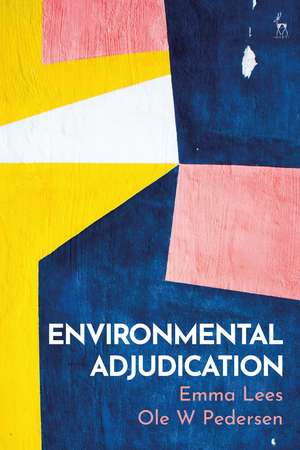Environmental Adjudication
Autor Emma Lees, Ole W Pedersenen Limba Engleză Hardback – 16 sep 2020
| Toate formatele și edițiile | Preț | Express |
|---|---|---|
| Paperback (1) | 224.76 lei 6-8 săpt. | |
| Bloomsbury Publishing – 23 mar 2022 | 224.76 lei 6-8 săpt. | |
| Hardback (1) | 511.14 lei 6-8 săpt. | |
| Bloomsbury Publishing – 16 sep 2020 | 511.14 lei 6-8 săpt. |
Preț: 511.14 lei
Preț vechi: 731.62 lei
-30% Nou
Puncte Express: 767
Preț estimativ în valută:
97.81€ • 102.38$ • 81.41£
97.81€ • 102.38$ • 81.41£
Carte tipărită la comandă
Livrare economică 01-15 aprilie
Preluare comenzi: 021 569.72.76
Specificații
ISBN-13: 9781509931460
ISBN-10: 1509931465
Pagini: 272
Dimensiuni: 156 x 234 mm
Greutate: 0.54 kg
Editura: Bloomsbury Publishing
Colecția Hart Publishing
Locul publicării:London, United Kingdom
ISBN-10: 1509931465
Pagini: 272
Dimensiuni: 156 x 234 mm
Greutate: 0.54 kg
Editura: Bloomsbury Publishing
Colecția Hart Publishing
Locul publicării:London, United Kingdom
Caracteristici
Builds on the examination of judges to suggest what constitutes good environmental adjudication
Notă biografică
Emma Lees is Reader in Environmental and Property Law at University of Cambridge.Ole W Pedersen is Professor of Environmental and Energy Law at Newcastle University.
Cuprins
1. Introduction2. Defining Adjudication: Nature and Challenges I. Introduction II. Theorising about Adjudication A. Defining Adjudication B. Winners, Losers and Polycentricity C. Argumentation, Reason and Proof D. Generalisable Rules E. Institutionalised Decision-Making and Independence III. Defining the Environment IV. Challenging Adjudication A. Politics, Policies and Values B. Science and Proof C. Shifting Regulatory Standards, a Lack of Resources and Inexperience D. Winners and Losers in the Adversarial Process V. Conclusions 3. Multidimensional Environmental Adjudication I. Introduction II. Theory-Building III. Th e Multidimensional Practice of Environmental Law A. Playing with Blocks B. Elements C. TechniquesD. Avenues E. Case Study - Dover v CPRE Kent F. Conclusions IV. Linearity and Inevitability V. Level of Law-Making Power VI. Conclusions 4. Avenues of Environmental Law Adjudication I. Introduction II. Functions and Institutions III. Statutory Appeals IV. Judicial Review V. Criminal Law and Sanctions A. Judicial Criminal AdjudicationB. Administrative Criminal Adjudication VI. Private Law VII. Conclusions 5. Avenues of Adjudication as Power-Broker I. Introduction II. Adjudication and Power A. Fact-Finding B. Interpretation and Creation of Norms C. Access to Adjudicatory Fora III. Power to Resolve Disputes A. Constitutional Principles and Jurisdiction B. Power Vis-à-Vis the Parties C. Power Vis-à-Vis Other Adjudicators D. Conclusions IV. Powers of Evidence and Fact-Finding V. Power to Interpret Existing Rules and Create New Rules VI. Power to Confer and Deny Access VII. Conclusions 6. Avenues as Frames of Reasoning I. Introduction II. Forms of Reasoning A. Reasons B. Processes III. Public and Private Interest A. Private Interests B. Public Interest IV. Th e Environment V. Level of Scrutiny VI. Handling and Analysis of Scientific Information A. Engagement with Methodology B. Deference to Natural England and the Environment Agency C. Reviewing Use of Expert Opinion VII. Objectivity, Impartiality and Neutrality VIII. Conclusions 7. Avenues as Remedy Determining I. Introduction II. Forms of Remedy A. Statutory Appeals B. Judicial Review C. Private Law D. Criminal Law III. Environmental Considerations and Remedies A. Sentencing B. Costs C. Absence of Remedy IV. Conclusions 8. Th e Bricolage of Environmental Adjudication I. Introduction II. Bricolage and Incoherence III. Understanding Good Adjudication IV. Conclusions
